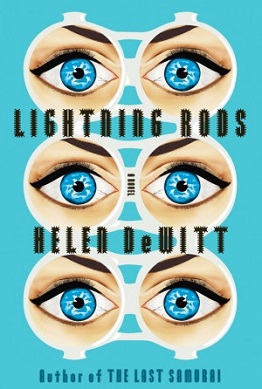“Lightning Rods” by Helen DeWitt: A Satirical Masterpiece Exploring Corporate Culture, Ambition, and Taboos

Introduction
Helen DeWitt’s “Lightning Rods” is a daring and satirical novel that navigates the uncharted territories of corporate culture, ambition, and societal taboos. In this extensive review, we will delve into the novel’s unconventional narrative, analyze its audacious themes, explore the complex characters, and assess the impact of DeWitt’s work on contemporary literature. Set against the backdrop of the business world and its eccentricities, “Lightning Rods” challenges conventional norms with its dark humor, incisive social commentary, and exploration of the human desire for success at any cost.
Plot Overview
The Unorthodox Business of Lightning Rods
“Lightning Rods” introduces readers to the unorthodox business venture conceived by protagonist Joe, an enterprising salesman seeking to capitalize on corporate desires and societal taboos. Joe’s ingenious idea involves the installation of anonymous women, known as “lightning rods,” in corporate offices to fulfill the sexual needs of male employees discreetly. As the narrative unfolds, the novel becomes a satirical exploration of ambition, power dynamics, and the lengths to which individuals will go to achieve success in the cutthroat world of business.
Joe’s Entrepreneurial Odyssey
The plot follows Joe’s entrepreneurial odyssey as he navigates the challenges of establishing and expanding his controversial enterprise. Through strategic alliances, unexpected hurdles, and ethical quandaries, the novel invites readers to question societal norms, the commodification of desire, and the consequences of unchecked ambition. Joe’s journey becomes a lens through which DeWitt explores the intersections of sexuality, power dynamics, and the pursuit of success in the corporate realm.
Character Depth and Development
Joe: The Unlikely Entrepreneur
At the center of “Lightning Rods” is Joe, the unconventional entrepreneur with a vision that challenges societal norms. DeWitt crafts Joe as a complex character, driven by a mix of ambition, pragmatism, and an unwavering belief in the potential success of his controversial business model. Joe’s character development prompts readers to grapple with their own preconceptions, moral judgments, and the ethical boundaries that define acceptable behavior in both personal and professional spheres.
Sheila: The Lightning Rod
Sheila, one of the lightning rods, emerges as a central character whose perspective offers insight into the emotional and psychological toll of participating in Joe’s venture. Sheila’s character becomes a vehicle for exploring themes of agency, consent, and the impact of societal expectations on individual choices. DeWitt’s portrayal of Sheila adds layers of complexity to the novel’s social commentary, challenging readers to confront their assumptions about gender roles and power dynamics.
Thematic Exploration
Ambition and Corporate Culture
“Lightning Rods” serves as a biting critique of ambition and corporate culture, exposing the often-unspoken desires and power dynamics that shape professional environments. DeWitt’s exploration of ambition becomes a lens through which readers witness the compromises individuals make in their pursuit of success, raising questions about the ethical boundaries of entrepreneurship and the consequences of prioritizing ambition over societal norms.
Taboos and Societal Expectations
The novel confronts societal taboos and expectations head-on, challenging readers to question deeply ingrained beliefs about sexuality, gender roles, and the consequences of adhering to or subverting societal norms. DeWitt’s unflinching approach prompts readers to reconsider their own biases and preconceptions, fostering a dialogue about the ways in which societal expectations shape individual behavior and choices.
Impact on Contemporary Literature
Subverting Expectations
“Lightning Rods” has left an indelible mark on contemporary literature through its unapologetic subversion of narrative expectations and societal norms. DeWitt’s willingness to tackle taboo subjects with dark humor and intellectual rigor contributes to the ongoing evolution of literary boundaries. The novel challenges readers to engage with uncomfortable themes, prompting discussions about the role of literature in confronting societal taboos and pushing the boundaries of acceptable discourse.
Satirical Brilliance
The satirical brilliance of “Lightning Rods” has earned the novel acclaim for its wit, audacity, and incisive social commentary. DeWitt’s ability to weave humor into a narrative that tackles serious and taboo subjects showcases the power of satire to illuminate societal absurdities. The novel’s impact extends beyond literature, influencing discussions about the role of satire in critiquing contemporary culture and prompting reflection on the uncomfortable truths it unveils.
Critical Analysis and Reception
Praise for Boldness and Originality
“Lightning Rods” has received praise for its boldness, originality, and willingness to explore uncharted literary territory. Critics commend DeWitt’s audacity in tackling sensitive subjects with intelligence and humor, highlighting the novel’s contribution to a tradition of literature that challenges societal norms and expectations.
Controversies and Discomfort
While celebrated for its unique approach, “Lightning Rods” has not been without controversy. Some readers and critics have expressed discomfort with the novel’s themes and the satirical exploration of taboo subjects. However, proponents argue that the discomfort elicited by the novel is a deliberate choice, intended to provoke thought and challenge ingrained societal attitudes.
Conclusion
“Lightning Rods” by Helen DeWitt stands as a provocative and daring work of contemporary literature, challenging readers to confront uncomfortable truths about ambition, desire, and societal expectations. Through its unconventional narrative, complex characters, and satirical brilliance, the novel pushes the boundaries of acceptable discourse, sparking conversations about the intersections of ambition, power dynamics, and the human desire for success.
As readers engage with the audacious world of “Lightning Rods,” they are invited to question their own assumptions, moral judgments, and the societal norms that shape their perceptions. DeWitt’s novel is a testament to the power of literature to provoke, challenge, and illuminate the darker corners of the human experience. “Lightning Rods” has secured its place as a thought-provoking and controversial work that continues to influence contemporary discussions about ambition, desire, and the boundaries of acceptable discourse in literature and beyond.







